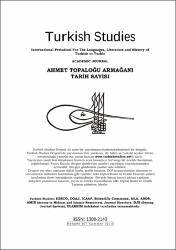Fuad Köprülü ve Türk tarihinde kökenler; süreklilik, dış tesir ve hususi tekâmül
Citation
Cihan, Cihad (2014) Fuad Köprülü ve Türk tarihinde kökenler; süreklilik, dış tesir ve hususi tekâmül, Turkish Studies, 9(7), 233-259.Abstract
Fuad Köprülü, modern Türk tarihçiliğinin kurucusu olarak kabul edilmektedir. Farklı sahalardaki çalışmalarıyla çok geniş bir coğrafyaya ve zamana dağılan Türk tarihini bir bütün halinde, tarihsel süreç içerisinde ele almıştır. Osmanlıdan Cumhuriyete kadar uzanan dönemde, Türk tarihçiliğinin romantik tarihçilikten rasyonel ve bilimsel tarihçiliğe geçiş sürecinde belirleyici bir etkisi olmuştur. Köprülü’nün öne çıkan özelliği, tarih usulüne, yani Türk tarihinin nasıl ele alınması gerektiğine dair teklif ettiği yeni yöntem biçimine, araştırmalarının kapsam ve derinliğine, Avrupa bilim ve metodunu Türkiye’ye taşıma çabalarına, Türk tarihi ve kültürü çalışmalarına yaptığı teorik katkılara dayandırılmaktadır. Ancak Köprülü’yü farklı kılan asıl özelliği Batı’nın ilmî usul ve anlayışını alırken Türk tarihinin ve kültürünün gelişimindeki farklılığı görerek buna uygun bir usulü tatbik etmesidir. Köprülü muhtelif sahalarda Türk tarihi ve kültürü ile ilgili yaptığı çalışmalarında önce meselenin o günkü durumunu ele alır, yerli, yabancı dilde yazılanları değerlendirir. Daha sonra nasıl bir usul takip edilmesi gerektiğini, Türk tarihinin gelişim farklılığını da dikkate alarak tespit eder. Meselenin Türk tarihindeki kökenini bulmaya çalışır, daha sonra tarihi sürekliliği adım adım takip eder. Bu takipte dış tesirleri mukayeseler yoluyla belirler. Son olarak hususi bir tekâmülü kaynaklarıyla birlikte ortaya koyar. Türk tarihi ve kültürüyle ilgili yaptığı bütün çalışmalarında bu yönteme dair pek çok örnek görülmektedir. Fuad Köprülü is regarded as the founder of the modern Turkish
historiography. With his works in different areas spread across a wide
geography and time in Turkish history has investigated in the historical
process as a whole. He has been a decisive impact on the transition
process of Turkish historiography from romantic historiography to
rational and scientific historiography in the period extending from the
Ottoman Empire to the Republican period. Köprülü's outstanding
feature was his historical methodology, namely how Turkish history
should be handled. On this matter, he offered a new method for the
historical research. The scope and to the depth of his researches, his
theoretical contributions on the studies of Turkish history and culture
were based on his efforts on the carrying of European science and
method into Turkey were the reasons for this understanding.
However, the main feature distinguishes Köprülü was his noticing
the differences in the development of Turkish history and culture and
applying a methodology proper to this by taking the scientific principles
and understanding of western world. Köprülü on his works on the
various fields of Turkish history and culture first considers the
contemporary position of the subject and evaluates the national and
internationals writings. Then he determines the methodological method
by taking account of the different developing process of Turkish history.
He tries to find the roots of the subject in the Turkish history then step
by step follows the historical contiunity. He determines the external
effect factors by comparisions. Finally he exposes the special
development by showing it with sources. Many examples can be seen
about this methodlogy on his works about the Turkish history and
culture.
Source
Turkish StudiesVolume
9Issue
7URI
http://www.turkishstudies.net/DergiTamDetay.aspx?ID=7197https://doi.org/10.7827/TurkishStudies.7197
https://hdl.handle.net/11630/7914



















